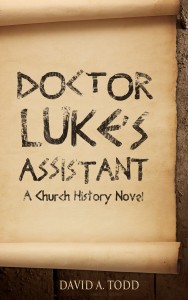I now have about eight posts on this blog in which I’ve mentioned my novel-in-progress, China Tour. I see, however, that I haven’t really said much about how it is I came to write this, when I first thought of it, what I’ve done about that over the years. On the odd chance that this becomes a bestseller, and hoards of fans of it want to know why I wrote it, I’ll go into that here. I don’t know if I’ll fit it all in one post or not.
In January 2003 I finished the first draft of my first novel, Doctor Luke’s Assistant. I wrote that in a creative slow rush, over two or three years. At the time I had no intentions of becoming a writer. The only other creative writing I was doing was some poetry. DLA was simply a story I wanted to tell.
Knowing nothing about how to be published, or how to write a novel, I set the book aside and began studying the market. Some people would say that was backwards. You should first learn how to write a novel, and study the market extensively, before actually writing the novel. Perhaps so, but in my creative rush I did it the other way. As I would learn later, letting a book sit for a time after completing the first draft and getting into the editing is a good thing. Who knew? I just did it.
Since I attend professional and technical conferences for my engineering profession, I figured I’d have to do the same. So I signed up for a regional writers conference in Oklahoma City, and meanwhile began using the internet to study novel writing and the market. By March 2003, at that conference, I still didn’t know much. I learned a lot at the conference. One of the best parts was a one-on-one appointment with Rene Gutteridge. She told me how my dialog was not what was needed, and in those short fifteen minutes gave me some good pointers. These were reinforced in a class I attended the second day of the conference.
From that I began the long editing process of my long novel, while at the same time beginning the querying process to editors. By the end of 2003 I had made three passes through DLA, and had received some rejections. I learned of a national Christian writing conference in Wheaton, Illinois in May, and signed up to attend. Our son living in nearby Chicago made selecting that conference a no brainer.
The biggest piece of eye-opening information I learned at WTP was that publishers don’t want to publish the book of a writer who has a story to tell. They want to publish the book of a writer who wants to have a writing career. Not one book, but many. Not a book and a sequel. Not a trilogy. No, someone who has the chance to have success with the book under consideration and then be able to produce more better books. [Ah, it does my writing heart good to write that in a grammatically and contextually correct way.]
This was a shocker. I think it was on the first day of the conference I heard that. No one would want to publish DLA unless I had other books coming, but I didn’t have other books coming. I just wanted to get DLA published. But I couldn’t under those circumstances. Self-publish it? No, too much negative stigma attached to self-publishing. I was stuck in author no-man’s-land, unless I could think of other books.
So for the rest of the conference, I sat in classes, workshops and sessions, thinking about what other books I could write. Poetry wasn’t an option, though even then I was thinking about something that eventually would become a book. Two novels came to mind. One came immediately: a baseball novel that eventually became In Front of Fifty Thousand Screaming People“. The other came to me more slowly, over the three days of the conference. That one is what I’m now writing.
So it took from May 2004 to October 2012 for the idea to actually become words on paper. If it was that long, I sure you all won’t mind waiting another day for a second post for me to tell more of the circumstances of the genesis of that idea.
Stay tuned.
